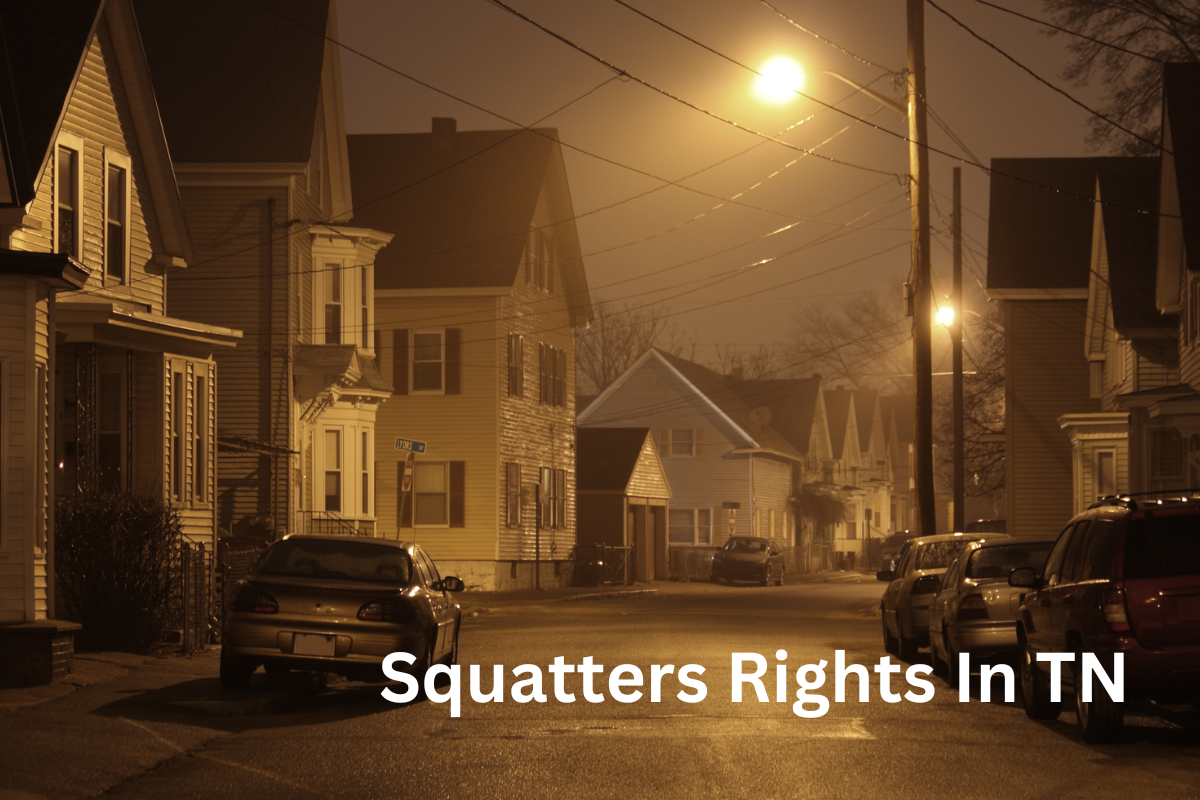Understanding Squatters’ Rights In Tennessee
Squatters’ rights in Tennessee can be complex and frequently misunderstood, particularly when protecting one’s property. As the housing market fluctuates, more properties are left vacant or abandoned, making them vulnerable to intruders.
To understand the operation of squatters’ rights in Tennessee, it is essential first to understand the definition of squatting. In general, a squatter is an individual who occupies an abandoned or unoccupied property without the owner’s permission.
Squatters must meet specific criteria to establish legal property ownership in Tennessee. These criteria encompass the payment of property taxes and the open habitation of the property for a specified duration. By recognizing these critical elements, property owners can protect their investments from potential intruders.
Table Of Content
1. The Legal Implications Of Squatting On Property Owners
2. Exploring Adverse Possession And Its Impact On Property Rights
3. Navigating The Complexities Of Squatters’ Rights In Tennessee
4. How To Protect Your Property From Unwanted Squatters
5. The Importance Of Knowing Your State’s Laws On Squatting
6. What Constitutes As Adverse Possession In Tennessee?
7. Taking Action: Steps To Evicting Squatters From Your Property
8. Examining The Gray Area Of Tennessee Squatters’ Rights Laws
9. The Role Of Landlords In Dealing With Potential Squatter Situations
10. How Long Does It Take To Evict A Squatter In Tennessee?
11. Can Police Remove Squatters In Tennessee?
12. Does Tennessee Have Squatters Rights?
13. What Is The Shortest Time For Squatters Rights?
The Legal Implications Of Squatting On Property Owners

Property owners in Tennessee housing market are increasingly concerned about squatting, which involves occupying another person’s property without their consent. The reality is more complex, despite the fact that it is true that many people might think squatters have few rights and can be easily removed.
Squatting may result in substantial legal repercussions for property owners, including financial losses and potential litigation. Consequently, property owners must be aware of their rights and available options when they are confronted with squatters.
In Tennessee, specific laws and procedures safeguard the rights of both property owners and squatters. Understanding these laws and their application to specific circumstances can facilitate effective navigation of the situation and protection of property from the potential repercussions of squatting.
Exploring Adverse Possession And Its Impact On Property Rights
An individual can acquire ownership of another person’s property through continuous and open use without the owner’s express permission. Adverse possession is relevant to residential and commercial Tennessee properties and can have a substantial influence on property rights.
Owners must understand this concept to protect their rights and prevent potential trespassing situations. The challenging nature of Tennessee adverse possession laws necessitates pursuing legal counsel.
Exploring the intricacies of this concept can help property owners acquire a more comprehensive comprehension of their rights and implement the necessary measures to protect their property from squatters.
Navigating The Complexities Of Squatters’ Rights In Tennessee

Property owners may find it challenging to understand the complexities of squatters’ rights in Nashville. As the housing market in the state capital of Tennessee surges, homeowners must be aware of their rights and protections regarding squatters.
While Tennessee law does not explicitly recognize the rights of squatters, legal procedures must still be followed to remove them from a property. Homeowners should become familiar with these procedures and, if necessary, seek legal counsel.
Property owners must also properly secure their vacant properties to prevent potential squatting situations. Nashville’s housing market is highly competitive, and householders can protect their property and avoid costly legal disputes by being proactive and informed about squatters’ rights.
How To Protect Your Property From Unwanted Squatters
Property owners in Tennessee competitive housing market must know that squatters may occupy their properties. Squatting is occupying a structure or domicile without the owner’s consent.
This can result in legal complications, financial losses, frustration, and inconvenience for property owners.
Initially, ensure that security measures and alarms adequately protect your property. Furthermore, conduct routine property inspections and promptly notify the authorities of suspicious activity.
Maintaining and upgrading your property is essential, as vacant structures are often the target of intruders. To understand your legal alternatives in this scenario, it is imperative that you familiarize yourself with the Tennessee rules and regulations governing squatters’ rights.
Implementing these measures to protect your property and prevent conflicts with undesirable occupants is possible.
The Importance Of Knowing Your State’s Laws On Squatting

Property owners may face legal and financial challenges when engaging with squatters if they do not thoroughly comprehend the pertinent laws. An awareness of the regulations and procedures unique to Tennessee can aid in safeguarding property and preserving rights as a homeowner or proprietor.
By becoming knowledgeable about these laws, you can take proactive measures to prevent trespassing and effectively manage any potential situations that may arise.
What Constitutes As Adverse Possession In Tennessee?
Adverse possession is a legal concept in Tennessee that allows squatters to lawfully acquire property ownership, provided that specific criteria are met. Given the increase in adverse possession cases in the state’s housing market, property owners must understand their rights.
Adverse possession must be established by the usurper’s visible and consistent occupation of the property for at least seven years without the owner’s permission. It must pay all property taxes during this time and maintain a good faith belief that they have a legal claim to the property.
Owners must be familiar with some elements to protect their properties from potential adverse possession claims.
Taking Action: Steps To Evicting Squatters From Your Property

Property owners in Tennessee must know their rights when dealing with squatters. If you discover that an individual is residing on your property without permission or a valid lease agreement, it is essential to begin the eviction process.
The initial step is to determine the squatter’s legal status and gather evidence of their presence on the property. Consequently, you will be obligated to furnish them with a formal eviction notice that must adhere to specific deadlines and include specific information.
If the occupant fails to vacate the premises after receiving the notice, you must request an eviction hearing in court. If the occupant refuses to vacate the premises, involving law enforcement may also be necessary.
The subsequent actions can be implemented to protect your property and assert your rights as a landowner in the Tennessee housing market.
If you no longer want to deal with all this hassle, call us at (423) 212-8384. Dignity Properties is here to help you through the entire process. We make it smooth and faster. Check out our home-buying process, and if you want to know what our clients are saying, check out our testimonials.
Examining The Gray Area Of Tennessee Squatters’ Rights Laws
Tennessee housing market has been plagued by the contentious issue of squatters’ rights for an extended period. The state has laws to protect property owners from trespassing and illicit land occupation, but there is a gray area regarding squatters’ rights.
These laws allow individuals who have occupied a property for a specified period without the owner’s consent to claim legal ownership. The duration of occupation and its motivations can be brutal, leading to a complex legal situation for property owners and squatters.
Tennessee has no specific laws regarding squatters’ rights, further exacerbating this issue. Property owners must understand their rights and take the necessary steps to protect their properties from intruders.
Furthermore, the absence of specific laws regarding squatters’ rights in Tennessee, in contrast to other states
The Role Of Landlords In Dealing With Potential Squatter Situations

Landlords in Tennessee housing market must know the potential for squatters to occupy their properties. Squatting is occupying another person’s property without their consent or legal authority.
In Tennessee, landlords are subject to specific laws that regulate their capacity to address potential squatter situations. As a landlord, you must be well-informed about these laws to protect your property and avoid legal complications.
This involves being aware of the appropriate methods for evicting squatters from your property and the various categories of squatters, including those who assert adverse possession claims. By maintaining awareness and adopting proactive strategies, landlords can protect their property rights effectively and mitigate potential squatting situations.
How Long Does It Take To Evict A Squatter In Tennessee?
Homeowners and landowners in Tennessee must know the state’s laws regarding the eviction process and squatters’ rights. Squatting is a growing concern in the state’s housing market, as it can lead to lengthy legal disputes and financial losses for property owners.
To safeguard your rights, act promptly and adhere to the appropriate procedures if you encounter a squatter on your private property. The eviction of a squatter in Tennessee can take anywhere from 15 days to several months, depending on various factors, such as whether the occupant has established tenancy.
It is imperative to seek legal counsel and meticulously navigate this complex process to prevent any complications or delays in regaining possession of your property.
Can Police Remove Squatters In Tennessee?

For property proprietors, squatters are a substantial risk. These individuals frequently capitalize on legal vulnerabilities and exploit the state’s lenient occupant rights laws.
Knowing your rights and taking preventive measures to protect your properties in Tennessee is essential for property owners. Law enforcement is widely believed to have the authority to evict squatters.
Police are only authorized to intervene if they witness criminal activity or are presented with a valid eviction order from a court. Property owners must obtain legal counsel to effectively navigate the complex process of evicting them from their respective properties.
Does Tennessee Have Squatters Rights?
Property owners in Tennessee must be mindful of their rights regarding squatters. The state’s housing market is characterized by a high prevalence of squatting, which can be challenging for homeowners.
Tennessee has implemented legislation protecting property owners from squatters, a fortunate development. However, it is important to become acquainted with these laws, and taking steps to prevent squatters from occupying your property is essential.
By understanding Tennessee squatters’ rights and implementing proactive measures, you can protect your property and avert potential legal disputes.
What Is The Shortest Time For Squatters Rights?
Property owners must understand squatters’ rights and the potential repercussions on property proprietorship in Tennessee housing market. In certain circumstances, they may be protected by state laws.
However, it is imperative to recognize that Tennessee must establish a timeline for squatters’ rights. The time squatters must wait to receive legal protection is contingent upon many factors, such as the nature of the property and the owner’s action.
It is essential that you, as a property owner, are aware of these factors and take proactive measures to protect your property from potential squatting situations.
Dignity Properties is a local house-buying company! We buy properties in any situation. We make competitive cash offers without the hassle of dealing with agents, banks, or lenders. Forget about the hassle! If you still have questions, check out our Frequently Asked Question Section or Contact us at (423) 212-8384. These findings apply to all cities and counties in Tennessee, including Chattanooga, Nashville, Memphis, and Knoxville.
| SQUATTER’S RIGHTS | SQUATTERS’ RIGHTS | NOTORIOUS POSSESSION | MONTH-TO-MONTH | TENANT | NOTICE TO QUIT |
| PROPERTY MANAGEMENT | PROPERTY MANAGEMENT SOFTWARE | MANAGEMENT | REAL ESTATE | MARKETING | LANDOWNER |
| LEGISLATION | JUDGE | COMPLAINT | BROWSER | SHERIFF | |
| COUNTY SHERIFF | TRESPASSERS | SPACE | INVESTORS | BLOG | FROM THE PROPERTY |
| THE PROPERTY TO | PROPERTY TO THE | MAKE AN ADVERSE POSSESSION | THE PROPERTY TO THE |

